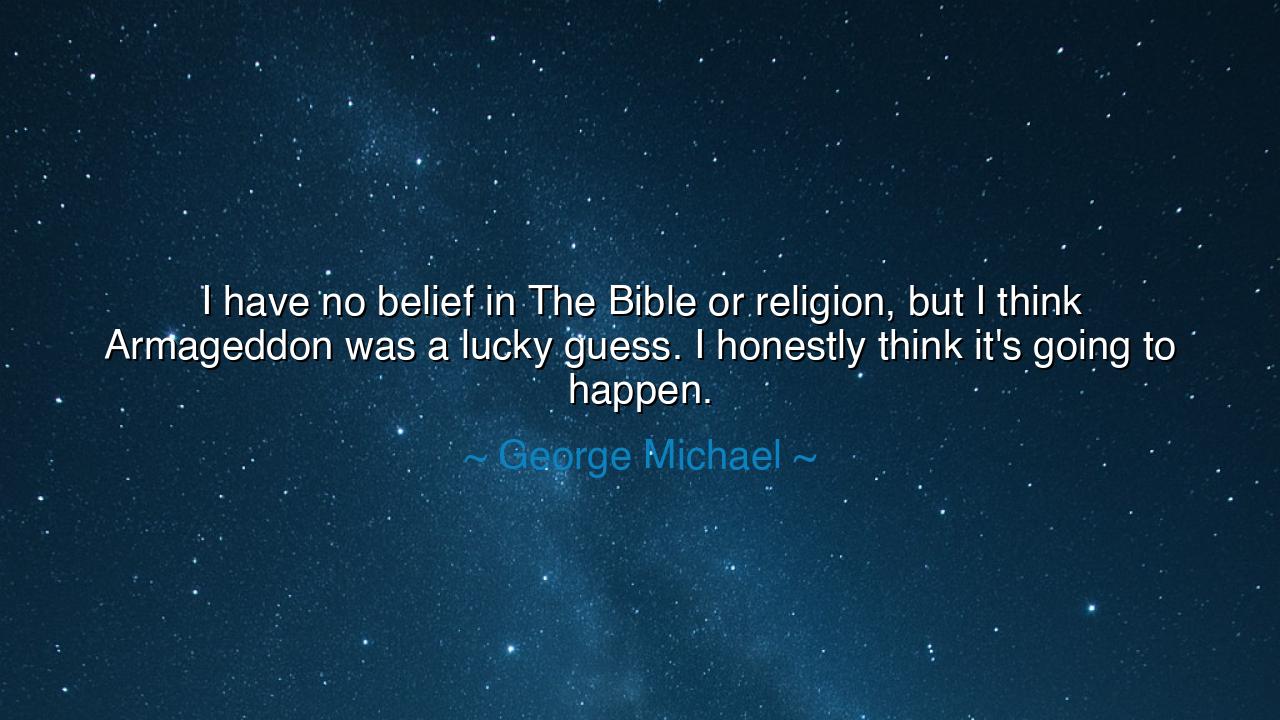
I have no belief in The Bible or religion, but I think Armageddon
I have no belief in The Bible or religion, but I think Armageddon was a lucky guess. I honestly think it's going to happen.






In the labyrinth of human thought, where faith and skepticism often collide, the words of George Michael strike at the heart of a profound truth: "I have no belief in The Bible or religion, but I think Armageddon was a lucky guess. I honestly think it's going to happen." Here, Michael acknowledges the power of the prophecies of old, not through faith or belief in their divine origin, but through a chilling understanding of the world’s inevitable fragility. The notion of Armageddon, the great and final reckoning of humankind, speaks not only to religious scripture but to the existential realities that shape our lives. Whether we are religious or not, the very idea of Armageddon—a catastrophic end to all things—lingers in the human consciousness like a shadow.
The ancients, in their wisdom, also pondered the fragility of life and the eventual fate of humanity. In the Greek myths, the gods were often portrayed as forces of destruction, bringing about the downfall of civilizations when they grew too proud or indulgent. The Iliad, while a tale of heroism and war, also speaks to the inevitability of death and fate, themes echoed throughout the tragedies of Sophocles and Euripides. The gods, while embodying ideals and aspirations, were also agents of chaos and endings, suggesting that even in the most glorious of human achievements, there was always the lurking awareness that everything could be undone. Thus, the idea of an Armageddon is not a new one—it is embedded in the human condition, a reflection of the cyclical nature of life and death, creation and destruction.
In modern times, as George Michael points out, we may reject the religious interpretations of Armageddon, but the idea itself still holds a certain power over our imaginations. The world around us, with its growing conflicts, ecological crises, and technological advancements, seems increasingly fragile. In many ways, the end of the world—whether literal or metaphorical—feels like an impending certainty. Whether through environmental collapse, political instability, or nuclear conflict, we are reminded daily of how close we are to the precipice. Armageddon, as Michael suggests, could be the result of our own actions, the outcome of human hubris and unchecked ambition. It is no longer just a concept from scripture, but a very real possibility within our grasp.
This vision of Armageddon, however, is not merely one of destruction but of warning. History, with its many cycles of rise and fall, offers numerous examples of civilizations that reached the height of their power only to collapse under the weight of their own excess. The Romans, in their imperial might, expanded their empire to its furthest limits, only to see it crumble under the pressure of internal strife and external invasions. The Maya civilization, with its advanced knowledge of astronomy and mathematics, saw its cities fall into ruin, victims of environmental degradation and warfare. Michael’s reflection on Armageddon invites us to consider the consequences of our actions, to realize that the downfall of great societies is often not a matter of fate, but a result of human choices—choices made out of greed, ignorance, and pride.
In many ways, Armageddon is not just an external event but a personal reckoning—a reminder that each of us must confront the consequences of our own choices. The ancient Stoics, led by thinkers like Marcus Aurelius and Seneca, believed that the end of the world, whether personal or universal, was inevitable. For them, the goal was not to fear this end but to live virtuously in the face of it. Marcus Aurelius, in his Meditations, reflects on the fleeting nature of life and the certainty of death, reminding himself that he must live with integrity, humility, and awareness because all things, including his own life, would eventually come to an end. In this way, the concept of Armageddon serves as a profound lesson: we must not live in fear of it, but rather live in full awareness of the consequences of our actions, making each day count toward the betterment of the world and ourselves.
Therefore, the lesson in George Michael’s words is not one of despair, but of reflection. The inevitability of Armageddon, whether through global catastrophe or personal reckoning, should not paralyze us with fear, but inspire us to live more consciously. If we acknowledge the fragility of our world—our relationships, our environment, our peace—then we are called to act with more wisdom, compassion, and awareness. Each decision, whether in our personal lives or in the way we engage with the world, carries weight. And so, let us heed the ancient wisdom of those who recognized the inevitability of the end, but also saw it as a call to live in harmony, to seek wisdom, and to build legacies that endure beyond the momentary.
In our own time, we can make the choice to be conscious of our impact, not only on the world around us but on the lives of others. Let Armageddon—whether real or symbolic—serve as a call not to fear but to live with purpose, integrity, and responsibility. Just as the ancients shaped their lives with awareness of their ultimate end, so too should we, for it is in understanding our fragility that we come to understand our true strength and capacity for transformation.






AAdministratorAdministrator
Welcome, honored guests. Please leave a comment, we will respond soon